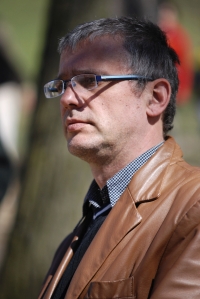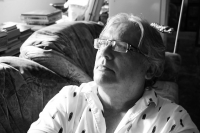To stand in front of the crowd and to experience such a sense of togetherness felt amazing

Stáhnout obrázek
Anton Pižurný was born March 17, 1961, in Želiezovce. The troops of the Warsaw Pact were just entering Czechoslovakia when the Pižurný family were coming back from holiday. The father, as a member of the Communist Party, found it very hard when the occupation started. Anton graduated grammar school in Banská Štiavnica. He studied librarianship, worked in bookshops and focused on his literary work. He was in touch with the Czech cultural scene and the Czech underground. Later, he returned to Banská Štiavnica and worked at a sawmill. After the violent events of November 17, 1989, in Prague, he decided to partake in the revolutionary process. He founded the Public Against Violence (VPN) branch in the sawmill, and consequently a town branch of VPN in Banská Štiavnica. Anton did not agree with the dissolution of Czechoslovakia. He founded an art agency and a publishing house as well as authored several poetry collections himself.

